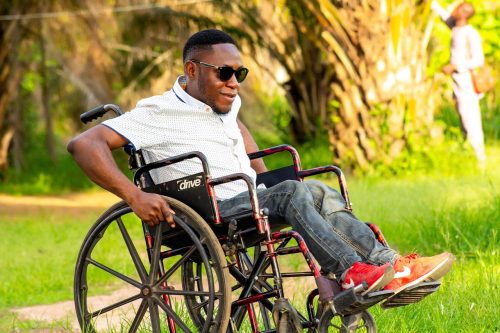During these difficult times, people with physical and intellectual disabilities are among the most heavily affected groups. Even before the pandemic, they already experience several forms of barriers that disallow them to participate in society fully.
As citizens, how can we make sure that we don’t further exclude them in a post-COVID19 world?
According to the International Labor Organization (ILO), persons with disabilities make up an estimated 1 billion (15%) of the world’s population, of which about 80 percent are working.
Experts say that work is good for our mental health, but a negative working environment can exacerbate situations and lead to other physical and mental health problems.
“Today, many persons with even the most serious mental illnesses are capable of working in mainstream, competitive jobs,” says, Marjorie L. Baldwin Ph.D., who is a health economist and an economics professor at Arizona State University.

A psychiatric illness like depression, bipolar disorder, schizophrenia, anxiety disorder, and post-traumatic stress disorder has debilitating effects on the person and those around them.
Still, multiple employment support programs have started to address the gaps. Psychiatrists argue that sustained employment is a crucial factor for recovery.
Creating Flexible And Accessible Working Conditions
Inclusion in the workplace starts with a good management strategy supported by office policies. Organization leaders must know the benefits of having a diverse workforce and adopt equal opportunity practices that don’t subscribe to the stigma against people with mental illnesses.
Projects that remove physical barriers, improve the delivery of information, and offer specialist counseling and support should be part of the priority.

- Focus On Health And Well-Being
Reduce work-related risk factors on staff such as inflexible working hours and high, unrelenting workload. A good program that focuses on staff well-being introduces wholesome games, physical activities, and other recreational options. Of course, suitable healthcare policies are ideal and help enhance employee retention.
- Invest In Raising Awareness And Training
Even though a company creates an accessible workplace, the culture and interpersonal relationships between staff play a massive role in ensuring a safe working environment. Sensitivity workshops and communication training will help non-disabled employees to gain more insight into physical and mental disabilities.

- Demonstrate Accountability
Leadership commitment is essential before expecting the employees to follow. Increasing transparency and clarifying reporting roles can significantly impact the way mental health is discussed, especially in addressing other types of developmental disabilities like ADHD and ADD. Conversely, disabled persons should also understand and be familiar with workplace policies.
- Remove Attitudinal Barriers
A 2017 study commissioned by the UK Prime Minister revealed that from those surveyed, only 11% of staff discussed a recent mental health problem with their manager, while half of the employees say they would opt not to discuss their mental health at all.
Promoting mental health should involve removing the stigma towards persons with disabilities and should rather be seen as capable people that can actively contribute to the company and society.
Why don’t people talk about mental health? Even though there is an increase in awareness about mental health, many people who experience distress try to keep their feelings hidden. Lack of knowledge about protective laws also hinders communities from discussing it.
Workplace cultures designed in a way that people can be themselves will make it easier for employees to speak about health concerns without fear.

Skills Matching And Job Coaching
Growing up with a mental illness can be very challenging. Coping with a society that isn’t for inclusive access takes time and government intervention to thrive.
Persons with mild conditions or high-functioning disabilities may need minimal support when it comes to job hunting, while others will require a more extended period of guidance. As individuals, how can we help support them?
- Look for a qualified job coach.
- Read about the law against discrimination.
- Find an industry or skills-based job to match.
- Build an attractive resume.
- Create a list of disabled-friendly workplaces.
- Practice the one-on-one interview if possible.
The COVID-19 crisis poses an added threat to people suffering from psychiatric illnesses. The risk in the way most governments respond to the pandemic is that persons with disabilities are getting left behind further, not just medically but also socio-economically.
It’s worth noting that decent and accessible work can make a difference in building resilience among those affected in any crisis.
